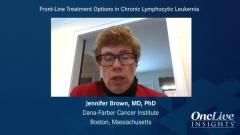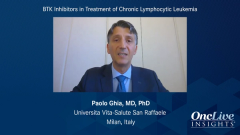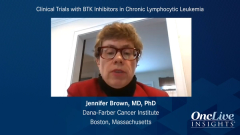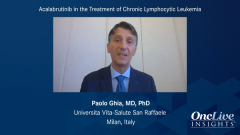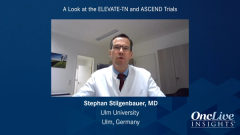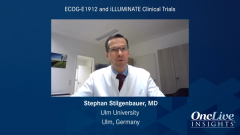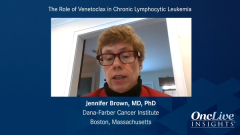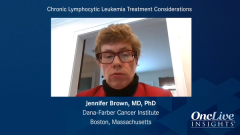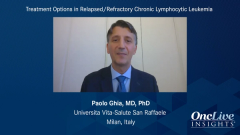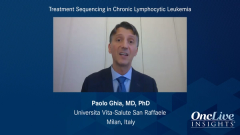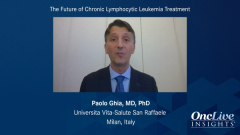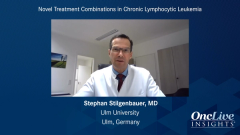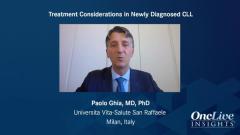
BTK Inhibitors in Treatment of Chronic Lymphocytic Leukemia
Dr Ghia provides an in-depth conversation on the use of Bruton tyrosine kinase inhibitors in treating chronic lymphocytic leukemia.
Episodes in this series

Paolo Ghia, MD, PhD: Nowadays, we have a number of options, particularly novel therapies, that we can use in the treatment of patients with chronic lymphocytic leukemia [CLL], particularly in the first-line setting, where the landscape is becoming quite crowded. After all, we have to apply a number of criteria to get to the best decision in terms of therapy for each individual patient. What I usually do is to first consider the genetic features of the patient’s leukemia that I am going to treat, particularly the immunoglobin gene status and the TP53 gene status.
Based on those who have operation of the TP53 genes and unmutated immunoglobin genes, I tend to avoid immunochemotherapy and prefer novel therapies, particularly for the few patients with TP53 aberrations who should not be treated with immunochemotherapy.
When I have decided this, I am then left with a small portion of patients with mutated immunoglobin genes devoid of any other poor prognosis or high-risk feature like TP53 gene. With those patients, I can theoretically propose immunochemotherapy only in young, fit patients for whom we know that FCR [fludarabine, cyclophosphamide, rituximab] is able to induce longer remission and response, which may last even more than 10 years.
I always discuss openly with the patient in this setting. I have to say that, on the side of immunochemotherapy, there is the pro of being a fixed duration compared with the BTK [Bruton tyrosine kinase] inhibitors, like ibrutinib or more recently acalabrutinib, which are to be taken continuously. Nowadays, we also have the approval of the combination of ibrutinib plus rituximab, which can be administered for only 12 months, so it is another fixed duration. It is a bit longer than FCR for 6 cycles, but it is still a fixed-duration treatment.
We know from the initial data of the CLL for teams started by the German CLL study group that ibrutinib plus rituximab seems to be able to achieve a plateau in terms of response in the patient with mutations. The follow-up is still short: We have only 3½ years, so we have to wait for a longer follow-up, but this could definitely be a good option for a patient with mutated immunoglobin genes who could achieve a long-term remission without being exposed to immunochemotherapy. We will see with future follow-up.
On the other side, we have all the other patients with unmutated immunoglobin genes or TP53 aberrations, where we indeed prefer to give novel therapies. Here, we have to consider a number of things. The first thing is that, for the patients with TP53 aberrations, we know that the continuous treatment with acalabrutinib with BTK inhibitors is able to achieve responses in 61% of the patients even after 6 years of follow-up.
This has been recently published by in the New England Journal of Medicine: an update of the study in the first-line setting where a patient with TP53 aberrations had been treated with acalabrutinib continuous therapy. When we look at a fixed-duration treatment like venetoclax plus obinutuzumab, we see that, although the patient had a benefit compared with the comparator arm of chlorambucil plus obinutuzumab in the CLL14 study, they still progress much earlier than patients without TP53 aberration when treated with venetoclax plus obinutuzumab.
At the moment, the safest and most beneficial treatment for this particular patient with TP53 aberration remains a continuous BTK inhibitor, not because the BCF2 inhibitors are not effective. We also know that continuous therapy with BCF2 inhibitors and venetoclax is effective in this population, but the fixed duration is probably not the best option that we can propose to these patients in whom the clone needs to be kept under control in a continuous manner.
We then move to the patient without mutations, and my consideration is this: I try to avoid immunochemotherapy as much as I can for all patient regardless of the age because there is no treatment that can achieve a plateau in terms of response. It is a durable response every time. At this point, we can think about a continuous treatment with BTK inhibitors or a fixed duration with venetoclax plus obinutuzumab. These patients definitely have a benefit from a fixed duration of venetoclax plus obinutuzumab when compared with chlorambucil plus obinutuzumab in a setting with older adults, but they progress a bit earlier than those with mutated immunoglobin genes.
Since it is a fixed duration, we can envision that, when this patient relapses and then needs the next treatment, we might even treat them again with the same treatment based on venetoclax, somehow sparing another line of therapy. Unfortunately, this still has to be demonstrated, so we do not know if it is possible or if we can prolong the total progression-free survival of the patient by treating them with the same therapy. At this moment, I would say that, for patients without mutations, we know that we can have a long-term response with continuous treatment with BTK inhibitors with acalabrutinib. We know that we have 70% of our patients who are free of relapse after 5 years of treatment. At the moment, continuous treatment might be the best option to propose to the patient with high-risk features, definitely for patients with TP53 aberrations and potentially for patients with unmutated immunoglobin genes as well.
Transcript edited for clarity.



